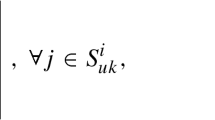Abstract
In this paper, a class of multi-input multi-output nonlinearly perturbed Markovian jump systems with partially unknown transition rates is considered. We assume that this class of systems is characterized only by some structural properties such as the system is strongly minimum phase, with a strict relative degree one set and positive definite high frequency gain matrices. For this class of systems, a universal adaptive high gain controller, which is not based on estimation algorithms or identification of parameters, is designed such that in the presence of certain nonlinear perturbations and external disturbances, the convergence and the boundedness of the closed-loop system signals in the mean square sense are ensured. A vertical take-off and landing (VTOL) helicopter example is provided to demonstrate the performance and effectiveness of the obtained results.




Similar content being viewed by others
Availability of data and material
Not applicable.
Code Availability Statement
The commercial software Matlab was used to carry out simulations and most of the calculations.
References
Feng X, Loparo KA, Ji Y, Chizeck HJ (1992) Stochastic stability properties of jump linear systems. IEEE Trans Autom Control 37:38–53
Boukas EK (2005) Stochastic switching systems: analysis and design. Birkhauser, Boston
Mariton M (1990) Jump linear systems in automatic control. Marcel Dekker, New York
Costa OLV, Fragoso MD, Todorov MG (2013) Continuous-Time Markov jump linear systems. Springer, Berlin
Shi P, Li F (2015) A survey on Markovian jump systems: modeling and design. Int J Control Autom Sys 13:1–16
Zhang L, Lam J (2010) Necessary and sufficient conditions for analysis and synthesize of Markov jump linear systems with incomplete transition descriptions. IEEE Trans Autom Control 55:1695–1701
Li F, Zheng WX, Xu S (2020) HMM-based \(H_{\infty }\) filtering for Markov jump systems with partial information and sensor nonlinearities. Int J Robust Nonlinear Control 30:6891–6908
Li Z, Li M, Xu Y, Huang H, Misra S (2018) Finite-time stability and stabilization of semi-Markovian jump systems with time delay. Int J Robust Nonlinear Control 28:2064–2081
Li H, Shi P, Yao D (2017) Adaptive sliding-mode control of Markov jump nonlinear systems with actuator faults. IEEE Trans Autom Control 62:1933–1939
Berdouzi D, El Hadri K, El Bouhtouri A (2021) Universal adaptive stabilization for a class of multivariable Markovian jump linear systems with partially unknown transition rates. IMA J Math Control Inf (in press)
Shen H, Li F, Wu ZG, Park JH (2016) Finite-time asynchronous \(H_{\infty }\) filtering for discrete-time Markov jump systems over a lossy network. Int J Robust Nonlinear Control 26:3831–3848
Song J, Niu Y, Lam J, Shu Z (2018) A hybrid design approach for output feedback exponential stabilization of Markovian jump systems. IEEE Trans Autom Control 63:1404-1417
Rakkiyappan R, Lakshmanan S, Sivasamy R, Lim CP (2016) Leakage-delay-dependent stability analysis of Markovian jumping linear systems with time-varying delays and nonlinear perturbations. Appl Math Model 40:5026–5043
Ilchmann A (1991) Non-identifier-based adaptive control of dynamical systems: a survey. IMA J Math Control Inf 8:321–366
Ilchmann A (1993) Non-identifier-based high-gain adaptive control. Springer, London
Ilchmann A, Ryan EP (2008) High-gain control without identification: a survey. GAMM-Mitt 31:115–125
Beniich N, El Bouhtouri A, Dochain D (2010) Input constrained adaptive tracking for a nonlinear distributed parameter tubular reactor. Int J Adapt Control Signal Process 24:249–260
Palis S (2018) Non-identifier-based adaptive control of continuous fluidized bed spray granulation. J Process Control 71:46–51
Bertrand S, Guénard N, Hamel T, Piet-Lahanier H, Eck L (2011) A hierarchical controller for miniature VTOL UAVs: design and stability analysis using singular perturbation theory. Control Eng Pract 19:1099–1108
Erginer B, Altuğ E (2012) Design and implementation of a hybrid fuzzy logic controller for a quadrotor VTOL vehicle. Int J Control Autom Syst 10:61–70
Ji Y, Li Y, Wu W, Fu H, Qiao H (2020) Mode-dependent event-triggered tracking control for uncertain semi-Markov systems with application to vertical take-off and landing helicopter. Meas Control 53:954–961
Alexis K, Nikolakopoulos G, Tzes A (2014) On trajectory tracking model predictive control of an unmanned quadrotor helicopter subject to aerodynamic disturbances. Asian J Control 16:209–224
Isidori A (1995) Nonlinear control systems, 3rd edn. Springer, London
Kushner HJ (1967) Stochastic stability and control. Academic Press, New York
Byrnes CI, Willems JC (1984) Adaptive stabilization of multivariable linear systems. In: Proceedings of the 23rd IEEE conference on decision and control, Piscataway, New Jersey, pp 1574–1577
Mao X (1999) Stability of stochastic differential equations with Markovian switching. Stoch Process Appl 79:45–67
Arnold L (1974) Stochastic differential equations: theory and applications. Wiley, New York
Krstic M, Kanellakopoulos I, Kokotovic PV (1995) Nonlinear and adaptive control design. Wiley, New York
Li H, Shi P, Yao D, Wu L (2016) Observer-based adaptive sliding mode control for nonlinear Markovian jump systems. Automatica 64:133–142
Lofberg J (2004) YALMIP: a toolbox for modeling and optimization in MATLAB. In: Proceedings of the 2004 IEEE international symposium on computer aided control systems design, pp 284–289
Sturm JF (1999) Using SeDuMi 1.02, a Matlab toolbox for optimization over symmetric cones. Optim Methods Softw 11:625–653
De Farias DP, Geromel JC, Do Val JB, Costa OLV (2000) Output feedback control of Markov jump linear systems in continuous-time. IEEE Trans Autom Control 45:944–949
Funding
No funding was received for conducting this study.
Author information
Authors and Affiliations
Contributions
All authors contributed to the design and implementation of the research, to the analysis of the results and to the writing of the manuscript.
Corresponding author
Ethics declarations
Conflict of interest
The authors declare that there is no conflict of interest.
Rights and permissions
About this article
Cite this article
Berdouzi, D., El Hadri, K. & El Bouhtouri, A. Robust adaptive stabilization by high gain feedback for Markovian jump systems with partially unknown transition rates. Int. J. Dynam. Control 10, 857–869 (2022). https://doi.org/10.1007/s40435-021-00861-w
Received:
Revised:
Accepted:
Published:
Issue Date:
DOI: https://doi.org/10.1007/s40435-021-00861-w



